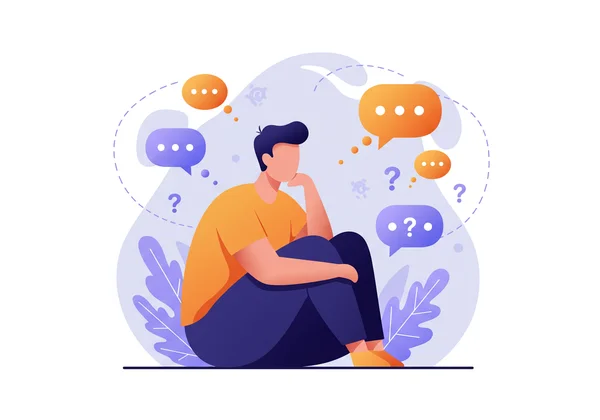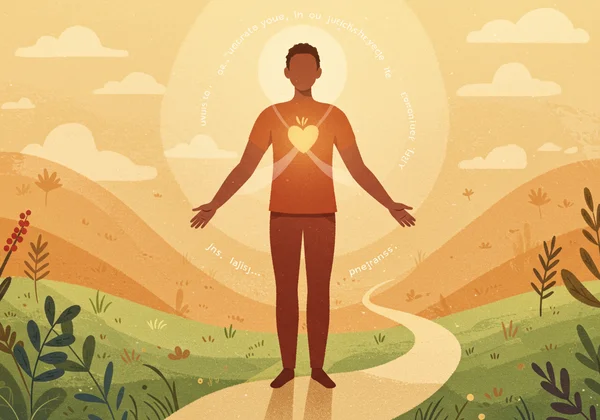Debunking Sexuality Myths: Facts About Sexual Orientation
August 10, 2025 | By Riley Foster
Feeling a bit lost when it comes to understanding your identity? You're not alone. It's easy to get caught in a fog of confusing ideas, especially when harmful sexuality myths are floating around. Many people ask themselves, 'Am I gay?' and finding clear, honest answers is essential. That's where this guide comes in. We're here to clear away those misconceptions with straightforward, evidence-based sexual orientation facts, helping you understand yourself and others with newfound clarity and confidence.
The path to self-understanding is yours alone, but you don't have to walk it in the dark. Misinformation can create shame and doubt, but knowledge is empowering. If you're looking for a starting point for your personal reflection, a confidential and supportive LGBTQ+ orientation quiz can offer valuable insights. It's a tool designed not to label you, but to help you understand your own feelings better.

Is Sexual Orientation a Choice, or Can It Change?
One of the most persistent and damaging myths is that sexual orientation is a simple choice. This idea often leads to the false belief that it can, or should, be changed if it doesn't align with societal norms. The truth is far more complex and deeply personal. The question of is being gay a choice misunderstands the fundamental nature of human attraction and identity.
The Scientific Understanding of Attraction
From a psychological and biological perspective, sexual orientation is not a conscious decision, like choosing what to eat for breakfast. Instead, it is a core part of who a person is. Decades of research suggest that orientation emerges from a complex interplay of genetic, hormonal, developmental, and social factors. The science of attraction shows us that these deep-seated patterns of emotional, romantic, and sexual attraction are not something one can simply will into existence or wish away. Your feelings are an authentic part of you, not a preference you've selected from a menu.
Why "Conversion Therapy" Is Harmful and Ineffective
The dangerous myth that orientation can be changed has fueled the practice of so-called conversion therapy. This is a range of pseudoscientific practices aimed at changing an individual's sexual orientation or gender identity. It’s crucial to know that every major medical and mental health organization in the world condemns these practices. They are not only completely ineffective but are also proven to cause severe psychological harm, including depression, anxiety, and self-hatred. True support means creating a safe space for exploration, not forcing change.
Dispelling the "It's Just a Phase" Myth
Another common piece of LGBTQ misinformation is the dismissive idea that questioning one's sexuality is "just a phase," particularly for younger people. This statement, while perhaps well-intentioned, invalidates a person's genuine feelings and can discourage them from exploring their identity. While self-understanding can evolve, the journey itself is always valid and significant.
Understanding the Nuances of Sexual Identity Development
A person's understanding of their sexuality can certainly evolve over time. This concept, often referred to as sexual fluidity, is a recognized part of human experience. However, this is very different from a temporary "phase." Identity development is a journey, not a destination. Someone might identify as straight for years before realizing they are attracted to the same gender, or they may discover they are bisexual after previously identifying as gay. This evolution doesn't make their past or present feelings any less real; it's a deepening of personal understanding.
The Normalcy of Questioning Your Sexuality
Let’s be perfectly clear: questioning your sexuality is completely normal. It is a sign of introspection, curiosity, and courage. In a world that often presents a very narrow view of love and attraction, it takes strength to look within and ask honest questions about your feelings. Whether your exploration leads you to a specific label or simply a better understanding of your unique attractions, the act of questioning is a healthy and essential part of knowing yourself. If you're in this process, know that you are not alone, and resources like an am I gay quiz can be a gentle first step.

The Truth About Labels and Self-Acceptance
Myths and misinformation often create immense pressure to fit into a specific box or label. While labels can be incredibly affirming for some, they can feel restrictive for others. The most important goal isn't to find the "perfect" label but to build a foundation of self-acceptance, no matter where your journey takes you.
Finding What Resonates: Labels vs. Personal Understanding
Labels like "gay," "bisexual," "pansexual," or "queer" can be powerful tools. They can help you find a community, access shared language and history, and feel a sense of belonging. However, your personal understanding of your own attractions and emotions is what truly matters. You are the ultimate authority on your own experience. If a label feels right and empowering, embrace it. If it doesn't, that’s perfectly okay too. You don’t need a label for your feelings to be valid.
Cultivating Self-Acceptance on Your Unique Journey
Fighting against years of internalized myths is not easy, but cultivating self-acceptance is one of the most rewarding things you can do. This means being patient and kind with yourself. It involves trusting your feelings, even when they feel confusing. Surround yourself with supportive people who respect your journey and honor your truth. Remember, this is your path. There is no right or wrong timeline, and there is no single "correct" outcome. Your identity is valid, beautiful, and yours alone. For those curious about their feelings, a confidential bisexual test can also be a part of this exploration.

Beyond Myths: Your Journey to Self-Acceptance
Debunking sexuality myths is about more than just correcting facts; it’s about creating a world where everyone feels safe and empowered to be their authentic selves. Your feelings are not a choice, a phase, or a mistake. They are a fundamental part of who you are, and they deserve to be explored with curiosity and compassion.
Your journey of self-discovery is unique and powerful. As you move forward, arm yourself with knowledge and trust your own heart. If you feel ready to explore your feelings further in a safe, private, and judgment-free environment, start your self-discovery today. Our tool, created by LGBTQ+ individuals and psychological experts, is here to support you as you reflect and learn.
Frequently Asked Questions About Sexual Orientation & Identity
Is it normal to question my sexuality?
Yes, it is completely normal and healthy. Questioning your sexuality is a brave step toward self-awareness and understanding your true feelings, regardless of what you discover.
Can my sexual orientation change over time?
For some people, sexual orientation can be fluid and may shift over their lifetime. For others, it remains stable. There is no single "correct" experience. The most important thing is to honor how you feel in the present moment without judgment.
How do you know if you're gay or bisexual?
There is no external sign; the answer lies in self-reflection on your patterns of emotional, romantic, and sexual attraction. It’s about who you are drawn to. Tools like a confidential online gay test can provide questions that guide this reflection, helping you organize your thoughts and feelings.
What is the difference between gay and bisexual?
Generally, "gay" refers to someone who is primarily attracted to people of the same gender. "Bisexual" typically describes someone who is attracted to more than one gender. However, these are broad definitions, and many people have their own nuanced understanding of what these labels mean to them.
Disclaimer: This article is for informational purposes only and is not a substitute for professional medical or psychological advice, diagnosis, or treatment. If you are experiencing distress, please seek help from a qualified professional.